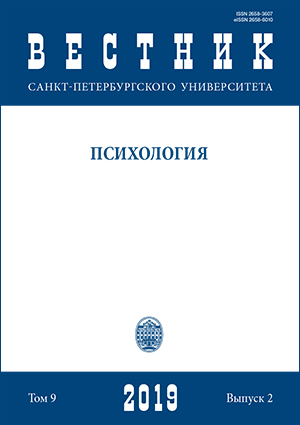Preliminary adaptation of the Russian version of the TEMPS-A questionnaire.
DOI:
https://doi.org/10.21638/spbu16.2019.205Abstract
H. S.Akiskal and coauthors have developed the Temperament evaluation Memphis Pisa, Paris and San Diego Autoquestionnaire for the analysis of affective temperaments. The concept of “temperament” was best suited for genetic research or constitutionally-defined trends, which is why the authors focused on studying temperament, and not character or the person as a whole. The concept of “affective temperament” is introduced to study the predisposition to various affective disorders. The basic 50-item TEMPS-A-Clinical Version of this technique distinguishes four types of temperament: hyperthymic, cyclothymic, irritable, dysthymic. The first type may indicate a mature emotional system, while the prevalence of other options al- lows judging the predisposition to the formation of immature emotional reactions (depres- sive, manic, psychopathic), which is reflected in the clinical picture of the spectrum of affective disorders. In this paper, we present the data of the preliminary adaptation of TEMPS-A for the Russian-language sample. The conventional “norm group” consists of 113 volunteers (45 men and 68 women) aged from 18 to 78 years. The factor structure of the Russian-lan- guage questionnaire was assessed using the exploratory factor analysis (EFA) using the princi- pal component method and quartimax rotation, consistency by calculating the Cronbach coefficient α. The test-retest reliability of the questionnaire was tested, a correlation analysis was conducted to assess the content and convergent validity of this method. The Russian version of the TEMPS-A questionnaire shows statistically significant results for the Russian sample.
Keywords:
affective temperaments, questionnaire, evaluation Memphis Pisa, Paris and San Diego Autoquestionnaire, TEMPS, Russian Version adaptation
Downloads
References
References
Factors in the Origin and Course of Affective Disorders. London, Gaskell, 1996, pp. 3–30.
temperaments in the Japanese general adult population. PLoS One, 2017, no. 12 (6). doi: 10.1371.
mood disorder patients, their first-degree relatives, healthy controls, and other psychiatric disorders. J. Affect
Disord, 2016, vol. 196, pp. 32–46. doi: 10.1016/j.jad.2016.02.013.
temperament and harm avoidance in medical students and staff. Psychiatry Clin Neurosci, 2018, vol. 72 (5), pp. 322–328. doi: 10.1111/pcn.12633.
Downloads
Published
How to Cite
Issue
Section
License
Articles of "Vestnik of Saint Petersburg University. Psychology" are open access distributed under the terms of the License Agreement with Saint Petersburg State University, which permits to the authors unrestricted distribution and self-archiving free of charge.




